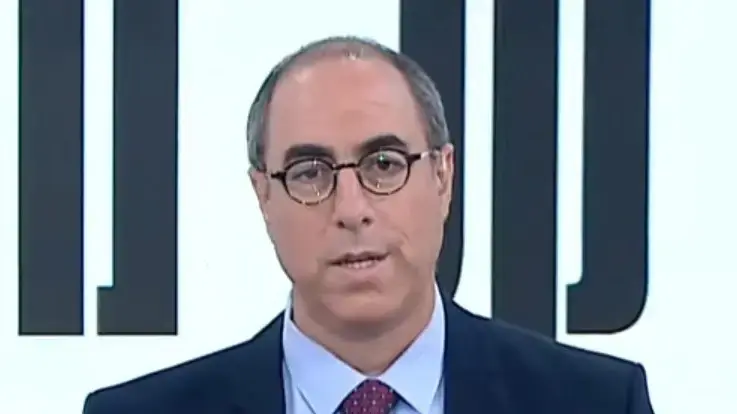"In Israel it's hard to find quality people who want to be teachers. It's not just because of the salary"
Andreas Schleicher, head of education at the OECD and creator of the PISA tests, looks at Israel and does not believe that the problems in education are solely because of the salary. "Young people are looking for meaning, interest and professional autonomy.
In Finland, everyone wants to be a teacher, even though the salary is not very different." Interview
Uri Sela
05/08/2022
Friday, 05 August 2022, 09:35
Share on Facebook
Share on WhatsApp
Share on Twitter
Share by email
Share in general
Comments
Comments
"Countries that closed schools due to Corona for a long time will see it in the results."
Andreas Schleicher (Photo: Reuters)
The head of education at the OECD, Andreas Schleicher, has made it his goal to change the traditional ways of learning.
He holds an orderly Mishna for the required steps.
At the beginning of chapters - moving from memorization to independent thinking, transferring powers to the schools and breaking the barriers between the strong and the weak.
"From learning content to learning capabilities, from leading the improvement from the top to autonomy to the front", he defines it in an interview with Walla!.
Schleicher may not be a household name, but he is one of the most influential people in global education.
The results of the PISA test, which he designed, are resonating in each of the dozens of participating countries. In this year's test, Schleicher also expects to see the effect of the governments' and education ministries' treatment of the corona virus. "Countries that closed schools for a long time will see it in the results, especially in students from disadvantaged backgrounds", he predicts, and reveals that "in the new tests we put more emphasis on creative thinking and added a model for solving crises".
The 58-year-old German statistician and mathematician has something to say about each of the 38 countries under his responsibility, including Israel.
He is not in a hurry to support the teachers' claims that the salary is the significant factor that prevents young people from entering the profession.
"In countries like Finland, there are eight applicants for every teaching position. Everyone wants to be a teacher there, even though the salary is not very different," he said.
"In Israel it is becoming more and more difficult to find quality people who want to be teachers. The salary could be one of the reasons for this, but when you compare it to other countries in the OECD, you see that it is not far from the average. I don't think that money alone will make teaching more attractive in Israel."
So what can change the equation?
"Young people are looking for meaning and interest in their work. Obviously, the salary matters, but what matters more is a high level of professional autonomy. In Israel, teachers have relatively little time to do other things. In most educational systems where teaching is attractive, you teach - but you do other things, you Accompanying the students, you develop a deep understanding of who they are and who they want to be and guide them outside the classroom as well. You have to ask yourself, if teachers are not appreciated in society, what is causing this? Where does it come from? People think to themselves, 'Teachers are just They read from the booklet, I can do it too', so they don't respect them. If you see them treat the students differently, work in collaboration with the parents, the appreciation comes by itself."
In talks about the new wage agreement, the Ministry of Finance and the teachers' organizations express different positions regarding the distribution of wages between young and veterans and rewards for excellence.
what is your position
"The distribution of wages is a recurring question in every country. A certain level of differentiation is important. If the salary is the same for everyone, teachers do not get rewarded for working in disadvantaged areas. It is important to make sure that the salary varies enough so that the most talented teachers reach the most difficult students."
Demonstration of teachers and teaching staff, Tel Aviv Museum Square, May 30, 2022 (Photo: Reuven Castro)
In the latest PISA tests, published in 2019, Israel recorded dismal results: a drop in achievement and a ranking below average in all three areas - reading, science and mathematics. The gaps between students in Israel were the largest among all countries.
"Israeli students are generally good at memorizing Vomiting of a substance.
They learn a lot of material and remember it," diagnoses Schleicher, "but in tasks where they have to apply it creatively, draw conclusions based on their knowledge, demonstrate their skills in new environments, we see that they have difficulty.
This shows a problem with the way of teaching - the details are taught instead of letting the students find the way by themselves and be active agents in acquiring the knowledge.
It's important to change that."
"In Israel there are huge gaps in performance between schools," he continues.
"Some of your schools are amazing, and some are lagging behind. The question is how you can direct the outstanding teachers to the schools that need them the most. Therefore, I say again that I believe that just paying teachers more will not solve Israel's problems. More attention should be paid to the distribution the resources".
The shortage of teachers in the education system (photo: official website, no)
"Education is not changing at the rate we would like to see. Specifically in Israel, the existing conditions can allow for a significant improvement"
Schleicher lists some examples of countries that were in a similar situation and overcame it.
"In Europe, the teaching
in Estonia
was very old-fashioned. Today it is the poster boy for innovation in pedagogy. There was a significant change in the education system: they transferred powers to the field, which created space for teachers' creative initiatives, and provided them with opportunities to collaborate with each other," he explained.
According to him, another country in Europe where there has been a significant improvement is
Portugal
.
"In the past, its education system was one of the most rigid in Europe, but since then it has progressed and given more room to the discretion of the schools. At first, the schools said they didn't want more autonomy, but to continue the way they were used to. The government said OK, so we won't transfer the money to the teachers, but to the students - and gave each of them a budget of one euro. At first a lot of money was wasted, the students used it to buy ice cream, but later they became more involved in the process and led it themselves."
Schleicher points out that
Shanghai
in China can also be an example of reducing gaps between schools.
"The gaps there were extraordinary, so they decided to connect strong and weak schools, so that the institutions could use the bonus they receive for excellence only to support the weak institutions. This step dramatically reduced the difference in achievements and made the education system in Shanghai one of the most outstanding in the world," he said.
"What they all have in common is the use of the expertise of the best teachers to assist and connect with the schools. Unfortunately, there are not many examples of such changes. Education is not changing at the rate we would like to see. Specifically in Israel, the existing conditions can allow for a significant improvement: the population is educated, the parents usually understand the importance of education, you have resources and technology. What is needed is to use them to leverage the change."
In the coming year, the reform of matriculation will begin, which includes a transition to jobs instead of tests in the spiritual professions.
She attracted quite a bit of criticism.
Do you think this is a step in the right direction?
"I think this is a good reform. The tests were a large part of the problem in teaching in Israel. They made the studies narrow and comprehensible, and evaluated the students based on memorization and not creative application. The new tests give more room for the students' judgment and interpretation. When you teach chemistry and physics, you don't want For the children to remember bits of information, but to think like scientists, and when you teach history you don't want to test on names and places but to test if the student can think like a historian, to understand the narrative of the nation's development. I'm sure it will take time and there will be difficulties at first, but it's a brave and important step." .
"The PISA test has significant results"
Schleicher rejects the criticism voiced by global experts on the way the PISA test is measured, and on the effect it creates in countries, which has been dubbed the "Pisa shock". "The test has significant results.
If we return to the question of salaries for beginning or veteran teachers, when you cannot see the result of one move or another, the question becomes political," he explained.
According to him, in recent years the global education system has made a lot of progress thanks to them.
"One of the changes that are affected by the PISA test is a shift from studying content to studying abilities.
The idea that success is not just knowing something, but being able to do something," he elaborated and listed other significant changes that occurred: "Most education systems now have a much broader concept of learning, social-emotional learning (SEL) has entered more into education.
In terms of the teaching profession, in the past the way of working was outdated, the Ministry of Education wrote the curriculum, handed it over to the teachers and they would teach it in class.
In the last decade we have seen a shift of responsibility to the front.
Teachers were given more space to design innovative teaching methods, instead of sorting the students they began to help them learn, believe in their abilities and find new ways to teach according to their differences."
What will be the next changes?
"Technology, especially artificial intelligence, forces us to think about what makes us human. The things we know how to teach best, like memorization, become irrelevant. This is one of the big questions we face. Technology is not magic, it is just a great amplifier. It will amplify ideas and good actions as you will increase bad ideas and actions and create value questions. The ability of human beings to make good decisions will be central to the way we perceive education. In the past we learned everything in the first part of our lives. You would go to school, move to university, finish - and die. In the future we will have to learn a large part Much more than life. Once we used to learn to work, now learning has become work itself.
The robots will not replace the teachers, but quite a few parts of the traditional teaching, such as the transfer of knowledge, will be done much better by technology.
The new parts of teaching, the social parts, the understanding of the students, will become much more important.
The teachers will not be less important, they will be much more important."
news
News in Israel
Education
Tags
oecd
Teachers













